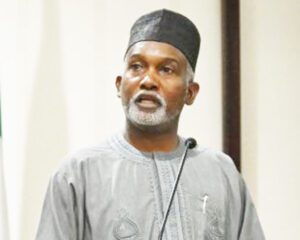
Digital Economy sector most successful, saves FG N45.7bn – Buhari
President Muhammadu Buhari says the digital economy sector has been most successful in the diversification of the nation’s economy, saving the Federal Government over N45.7 billion in IT projects clearance.
The President stated this when he unveiled and inaugurated two new policies developed by the Ministry of Communications and Digital Economy, on Thursday in Abuja.
While linking the two policies to the diversification and prosperity of the economy, President Buhari said the National Policy on the Nigerian Government Second-Level Domains and the National Data Policy, are central to accelerating the development of the nation’s digital economy sector.
He added that the Federal Government would continue to develop policies and programmes in furtherance of the diversification of the economy.
“In the last three and a half years, we have intensified the development of policies, design of programmes and implementation of projects in the digital economy sector and the impact has been very impressive.
“For example, we have succeeded in diversifying our economy to a large extent.
“And this is obvious when we consider the contribution of the ICT sector to our Gross Domestic Product (GDP) in the second quarter of 2022 which stood at 18.44 per cent, compared to the contribution of the oil sector to the GDP which was 6. 33 per cent in the same period,” he said.
The President noted that Nigeria’s strides towards a thriving digital economy started on Oct. 17, 2019 with the redesignation of the Ministry of Communications and Digital Economy and the restructuring of its mandate.
According to him, the changes have been phenomenal.
“We are proud of the great strides of our digital economy sector and the impact it has had on the different sectors of our economy and I commend the Minister for being committed to the implementation of the digital economy mandate.
“As part of our commitment towards ensuring the sustainability of our gains in the digital economy sector, we have taken steps to institutionalise the process by developing relevant policies and strategies,” he further stated.
According to him, a total of 21 new national policies and strategies have been developed by the Federal Government since 2019.
“The policies and strategies are national instruments to support Nigeria’s digital economy at the national and sub-national levels.
“The national policies have led to significant development across all sectors of our economy.”
On the issue of digital identity for the country, Buhari declared that the present administration had actively promoted it as key to a sustainable and secure development of the digital economy.
He added that this would ultimately promote the use of the right identity by all Federal Public Institutions.
While noting that “the National Policy on Nigeria Government Second-Level Domains is a welcome step in this direction,” he directed that all government officials should refrain from using private emails for official purposes.
He said Federal Public institutions (FPIs) must migrate their websites to the relevant government domains.
On the recent deployment of Starlink services by SpaceX in Nigeria, first of its kind in Africa, the president expressed his delight, declaring, “We are glad that Starlink services are already deployed in Nigeria. This has made Nigeria the first and only African country to have this link.
“With the deployment of Starlink services in Nigeria, we have 100 per cent broadband penetration in Nigeria.”
Earlier, Minister of Communications and Digital Economy, Prof. Isa Pantami said that the two policies being inaugurated were outcomes of compliance with the President’s directive to come up with a National Policy that was earlier approved by the Federal Executive Council.
He noted that the policies were targeted at consolidating on the gains achieved so far in the digital ecosystem.
The Minister enumerated the benefits to be derived from implementing the policies.
He said the ministry relied on relevant provisions of the Constitution of Nigeria 1999 as amended, and the NITDA Act 2007, with the belief that they would go a long way in consolidating the achievements in the digital economy sector.
On the National Data Policy, Pantami reiterated the indispensability of data in national life, emphasising that data was critical and could be leveraged on for the development of other sectors of the economy.



